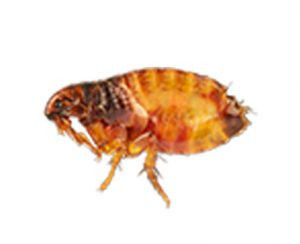Fleas most commonly occur in homes with pets, but they can also be carried in on your clothes, or migrate in from abandoned bird and rat nests and other animal dens in search of fresh blood hosts.
Once you recognise that you have a flea problem, it is important to take action immediately to stop the infestation from getting any worse. In warm, humid conditions, fleas can take only two to three weeks to reproduce, making them a problem that can soon escalate out of control unless you take quick, effective action to eliminate it.
In order to get rid of fleas, you need to have a good understanding of the four stages of their life cycle. Eggs laid by adult female fleas on the host animal fall off and hatch within 12 days. The newborn larvae crawl to undisturbed, dark places such as cracks in floorboards, deep into carpet fibers, down the side of sofas, etc, where they feed on organic animal material.
After 5-11 days, the larvae spins a cocoon and enters the pupa stage which usually lasts for another 5-14 days, however, this can go on for up to five months. The cocoon is covered in a sticky substance that attracts dirt, which helps to keep conditions inside the cocoon moist, protecting the flea until it is ready to emerge. It is not exactly clear what triggers the adult flea to decide to emerge, although it may be vibrations or even the presence of carbon dioxide - indicating that a fresh blood feeding source may be close by.
Newly emerged adult fleas have to find a blood meal within a couple of days or they will die. Within two days of feeding, adult females are able to breed and lay eggs and this can continue for up to 100 days. Adult females can lay up to 500 eggs or more in their entire lifetime.
To get some perspective on the size of your flea problem, it is important to realise that the adult fleas that you see are only about 5% of the total flea population that are present in your home. The other invisible 95% are eggs (50%), larvae and pupa.
To control your flea infestation, you first need to exterminate adult fleas on their animal host and also clean up the environment both indoors and out where eggs, larvae and pupa may be hiding. Removal of adult fleas and eggs is relatively easy with repeated, thorough vacuum cleaning and spray on pesticides. The problem is the larvae buried deep in your carpet fibers or floorboard cracks, and the pre-emerged adults that are protected by their cocoons which spray pesticides do not reach.
This is where Imperial Pest Control can definitely be of help. Our experienced pest control technicians are familiar with the sorts of locations where flea eggs, larvae and pupa are likely to be hidden. They know how to effectively apply our state of the art, long-term residual pesticides both indoors and out to exterminate fleas at the different stages of their life cycle but at the same time minimise health risks to your family and pets.




